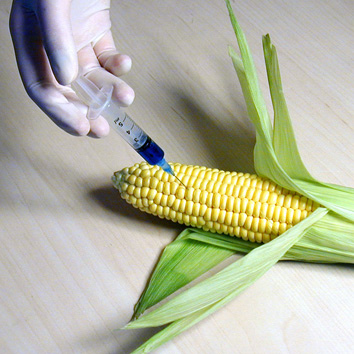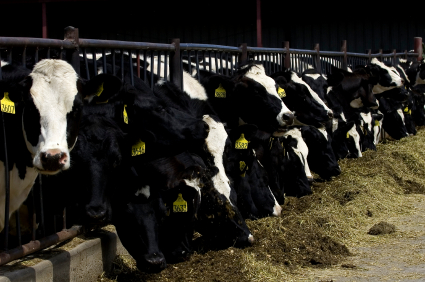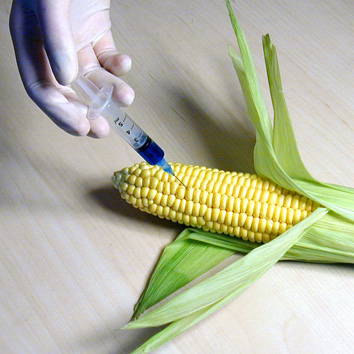The New York Times has another piece encouraging a flare-up in the cage match between organic farmers and those in favor of genetic engineering as the solution to future food needs. This one is centered on the “unlikely” but happy marriage of a plant geneticist and an organic farmer:
Pamela Ronald and Raoul Adamchak have every reason not to get along.
Ronald, a plant scientist, has spent her past two decades manipulating rice from her lab bench, bending the grain’s DNA to her whim. Adamchak, meanwhile, is an organic farmer, teaching college students the best practices of an environmentally gentle agriculture at his California market garden.
As Adamchak confesses, few have been more vociferously opposed to the genetic engineering practiced by Ronald than his organic movement, which has steadily grown in recent years to constitute an influential, if tiny, part of the U.S. farm system. So it can come as some surprise when Ronald and Adamchak let slip that they have been happily married for more than a decade.
Such a union should not be shocking, the couple argues. And a more modest version — sans marriage — must be considered by any farmer or consumer hoping for a sustainable future for agriculture.
… To spread their message to two communities that rarely speak in measured terms, Ronald and Adamchak have written a book, Tomorrow’s Table: Organic Farming, Genetics, and the Future of Food, which came out in paperback last month.
What Adamchak and Ronald pursue in the book is in essence a unified theory of farming. While critical of Western seed companies that have co-opted genetically modified (GM) crops for questionable business practices, the couple argues that both current and future generations of altered crops will, if responsibly managed, allow much of the world’s hungry to be fed from land already degraded by the plow’s slice and the tractor’s compressing wheel.
 Photo courtesy illuminating9_11 via FlickrIn addition to offering the shocking revelation that opposites attract, this news gets the usual contrarian suspects cheering. But to read the article, you’d think there are all these fantastic genetically engineering seeds just waiting to be planted if only the “powerful” organic lobby would let it happen. Only there aren’t. Not a one. And while Ronald, the plant scientist, urges open-mindedness among sustainable agriculture folks, her own major plant breeding project on flood-tolerant rice uses advanced breeding techniques and not genetic engineering.
Photo courtesy illuminating9_11 via FlickrIn addition to offering the shocking revelation that opposites attract, this news gets the usual contrarian suspects cheering. But to read the article, you’d think there are all these fantastic genetically engineering seeds just waiting to be planted if only the “powerful” organic lobby would let it happen. Only there aren’t. Not a one. And while Ronald, the plant scientist, urges open-mindedness among sustainable agriculture folks, her own major plant breeding project on flood-tolerant rice uses advanced breeding techniques and not genetic engineering.
It’s worth revisiting a Newsweek article from the summer that talked about the “return” of conventional breeding as the favored technique for developing new crops:
Part of the story is that conventional breeding can still do certain things extremely well — even better than genetic manipulation. What GM techniques are best at is isolating particularly useful bits of DNA in a prized plant, and transferring that single gene to another plant that is less well endowed. (In the best-known example, Monsanto spliced a gene from naturally herbicide-tolerant grass into soybeans, so farmers could apply the chemicals without killing their crops.) Conventional breeding still does better at building up qualities that require a complex suite of genes, such as the ability to fight off certain insects or to resist drought, which involves a host of genes that determine the way plants take up and manage water.
Roland would surely agree. And the fact is that the agricultural challenges before us require more than dropping in a gene here or there. To date, genetic engineering techniques have simply not shown themselves to be up to the task. The result is that the debate over GMOs as a sustainable solution remains entirely theoretical. The existing GMO seed lines require heavy doses of synthetic fertilizer and water (in the case of the Bt crops mentioned in the article) or heavy doses of synthetic pesticides, fertilizer, and water (in the case of Roundup Ready crops, the only other GMO seed line), neither of which are consistent with organic — or sustainable — practices.
In essence, this is an argument about federal research dollars not an argument about which seeds to plant. Wake me up when Monsanto invents a seed that can actually do all the things they’ve been promising us for the last couple of decades. In fact, don’t. It’s likely to be decades and decades before someone sees fit to rouse me. I could use the sleep.




